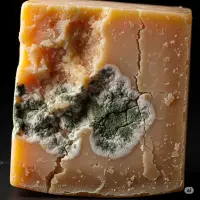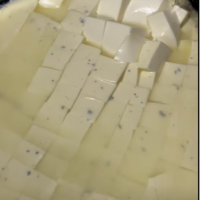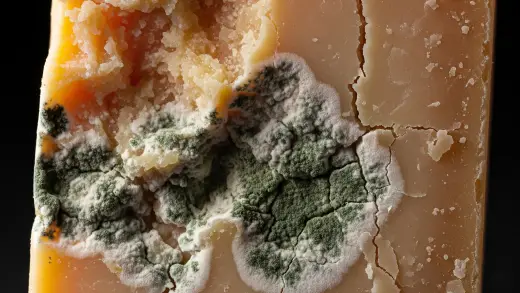Cheese curds typically last up to two weeks when properly stored in the refrigerator. Cheese curds have become a popular snack, especially in areas known for their cheese production like Wisconsin.
If you know, how to freeze the cheese curds, you can enhance its lifespan for up to two weeks. However, these delicious bite-sized chunks of cheese have a unique texture and a mild, slightly tangy flavor.
But how long do cheese curds last before they go bad? Understanding their shelf-life is important not only for enjoying their freshness but also for avoiding any potential health risks.
We will explore the factors that can affect the lifespan of cheese curds and provide some storage tips to ensure their maximum longevity. So, if you’re a cheese lover or simply curious about the lifespan of cheese curds, keep reading to find out more.
What Are Cheese Curds
When it comes to cheese, there are countless varieties that can tantalize your taste buds. One such variety that has been gaining popularity in recent years are cheese curds. What exactly are cheese curds? Let’s delve into its definition and origin, as well as the fascinating process behind their creation.
Definition And Origin
Simply put, cheese curds are small, fresh chunks of cheese that have a slightly rubbery texture. They are typically milder in flavor compared to aged cheeses, making them a versatile snacking choice. Cheese curds originated in the dairy-producing regions of the Midwest, particularly in the United States and Canada.
Process Of Cheese Curd Making
The process of making cheese curds involves a series of steps that require precision and expertise. To create these delectable nuggets, milk is first heated and then coagulated using a starter culture and rennet. Once the milk has coagulated, it forms a gel-like substance known as curds.
To separate the curds from the liquid whey, they are typically cut into small pieces and then stirred gently. The stirring helps release more whey and encourages the curds to fuse together and form a cohesive mass. This mass is then heated gradually, resulting in a firmer texture.
Once the desired texture is achieved, the curds are removed from the heat and cooled, preserving their rubbery consistency. At this stage, the cheese curds can be enjoyed immediately or further processed for different culinary uses.
It’s worth noting that cheese curds are typically made from cheddar cheese or similar types. This gives them a mild, creamy flavor that pairs well with a variety of toppings and accompaniments.
Cheese curds can be eaten on their own as a snack, or they can be added to salads, poutine (a Canadian dish), sandwiches, and even melted over french fries for a deliciously cheesy treat.
Types And Varieties
When it comes to cheese curds, there are various types and varieties that cater to different tastes and preferences. From fresh cheese curds to aged options, and even flavored variations, there is truly something for everyone to enjoy. Let’s explore each type in more detail.
Fresh Cheese Curds
Fresh cheese curds are a delicacy that cheese enthusiasts simply cannot resist. With their squeaky texture and mild, milky flavor, these curds provide a delightful snacking experience. Made using the curdling process, fresh cheese curds are typically enjoyed on their own.
These curds have a relatively short shelf life, lasting about two to three days. It is recommended to store them in an airtight container in the refrigerator to maintain their freshness.
However, if you wish to prolong their shelf life, you can freeze fresh cheese curds for up to three months. Freezing them does alter their texture slightly, but they still retain their delicious flavor.
Aged Cheese Curds
Aged cheese curds, as the name suggests, undergo a longer aging process compared to their fresh counterparts. This aging process adds complexity and depth to their flavor, resulting in a more robust taste profile. Aged cheese curds develop a nuttier and sharper flavor as they mature.
Due to their longer aging period, these curds have a significantly longer shelf life, lasting up to several months when stored properly. It is important to note that the texture of aged cheese curds may become more crumbly over time, but this does not affect their quality or taste.
Flavored Variations
If you’re looking for a unique twist on traditional cheese curds, flavored variations are a great choice. These curds are infused with various flavors, adding an extra layer of excitement to your cheese tasting experience. From spicy jalapeno to savory garlic and herb, there is no shortage of options to explore.
When it comes to storage, flavored cheese curds follow the same guidelines as their fresh or aged counterparts. Keep them in an airtight container in the refrigerator to maintain their freshness for the suggested shelf life.
In conclusion, cheese curds come in different types and varieties, each offering a distinct taste and texture experience. Whether you prefer the squeaky freshness of fresh curds, the depth of flavor in aged curds, or the adventurous flavors of flavored variations, there is a cheese curd out there for everyone to enjoy.
Optimal Storage Practices
Cheese curds, with their squeaky texture and creamy flavor, are a beloved delicacy for cheese enthusiasts. To fully enjoy their freshness and extend their shelf life, it’s crucial to know the optimal storage practices for cheese curds. By employing the right refrigeration techniques, freezing methods, and proper packaging, you can ensure that your cheese curds stay delectable for an extended period.
Refrigeration Techniques
Refrigeration is key in preserving the quality and flavor of cheese curds. Ideally, cheese curds should be stored at temperatures between 34°F and 38°F (1°C and 3°C) to maintain their freshness. Here are some refrigeration techniques to follow:
- Place your cheese curds in the coldest part of your refrigerator, such as the back of the lower shelf or the crisper drawer. This ensures that they are exposed to the most consistent temperature and are less susceptible to temperature fluctuations.
- Keep the cheese curds in their original packaging if unopened. The original packaging is designed to maintain the ideal level of moisture and prevent excessive drying.
- If the cheese curds are already opened, tightly wrap them in plastic wrap or aluminum foil. This assists in retaining their moisture and prevents them from absorbing odors from other foods in the refrigerator.
- Remember to consume the curds within the recommended time frame to enjoy their best texture and flavor.
Freezing Cheese Curds
Freezing cheese curds is a great option if you want to extend their shelf life beyond a few weeks. Proper freezing techniques help retain their taste and texture. Follow these steps to freeze cheese curds:
- Divide the cheese curds into convenient portions that you can use at once. This allows you to thaw only the amount you need, minimizing waste.
- Wrap the portions tightly in freezer-safe plastic wrap to prevent freezer burn and prevent the curds from absorbing any odors from the freezer.
- Place the wrapped portions in a freezer bag and remove any excess air before sealing. This additional layer offers extra protection against freezer burn.
- Label the freezer bag with the date of freezing to ensure you consume the cheese curds in a timely manner.
- When ready to use, thaw the frozen cheese curds in the refrigerator overnight. Avoid thawing them at room temperature to minimize the risk of bacterial growth.
Packaging For Longevity
Selecting the right packaging for your cheese curds is essential for ensuring their longevity. Here are some packaging techniques:
- Invest in airtight containers that are specifically designed for storing cheese. These containers help maintain the ideal moisture level and protect the curds from exposure to air, which can cause drying and loss of flavor.
- If using plastic wrap or aluminum foil for storage, make sure it is tightly sealed to minimize air exposure.
- Consider vacuum-sealed bags for long-term storage. These bags remove air from the packaging, creating an optimal environment for preserving cheese curds.
- Keep the cheese curds away from strong-smelling foods in the refrigerator to prevent them from absorbing unwanted odors.
By following these optimal storage practices, you can prolong the shelf life of your cheese curds and ensure that each bite delivers the same fresh, squeaky experience as the day they were made. Enjoy every savory morsel!
Spotting Spoilage Signs
As cheese curds are a beloved snack for many cheese enthusiasts, it’s important to be aware of the signs of spoilage. This will ensure that you can fully enjoy their fresh and squeaky texture. In this article, we will explore the various spoilage indicators for cheese curds, including color and texture changes, odor indicators, and the necessity of tasting for quality assurance.
Color And Texture Changes
The color and texture of cheese curds can provide valuable insights into their freshness. When cheese curds start to spoil, they may undergo noticeable changes. Keep an eye out for the following:
- Discoloration: Fresh cheese curds typically have a bright, creamy white color. If you notice any yellowing or browning, it may indicate that the curds have started to deteriorate.
- Texture: Healthy cheese curds are known for their iconic squeaky texture. However, if they become mushy, slimy, or develop an unusual hard texture, it’s a sign that spoilage has occurred.
Odor Indicators
The nose can be an exceptional tool for detecting spoilage in cheese curds. Pay attention to any unusual odors that develop, as they can be indicative of spoilage. Some common odor indicators include:
- Sour or Ammonia Smell: Cheese curds that give off a strong sour or ammonia-like odor are likely past their prime. These unpleasant smells are a clear indication of spoilage.
- Off-Putting Aromas: If your cheese curds emit any strange, rancid, or moldy smells, it’s best to err on the side of caution and avoid consuming them.
Tasting For Quality Assurance
If you’re still unsure about the freshness of your cheese curds, a taste test can provide further assurance. Here are some key considerations when tasting:
- Flavor: Fresh cheese curds have a mild and slightly salty taste. If you notice any intense or off-flavors, it’s a sign that the curds have gone bad.
- Mold Presence: While certain types of cheese have natural molds, visible mold growth on cheese curds is a red flag.
Remember, when it comes to consuming any food product, trust your instincts. If something seems off or questionable, it’s always best to prioritize your health and safety by discarding the suspect cheese curds.
Fresh Curds Longevity
When it comes to enjoying cheese curds, one question that often arises is: how long do they last? The longevity of fresh curds can depend on several factors, including storage conditions and other environmental factors.
Let’s explore the expected lifespan of cheese curds in refrigeration, as well as the key factors that can affect their shelf life.
Expected Lifespan In Refrigeration
When properly stored, cheese curds can typically last for about one to two weeks in the refrigerator. This timeframe can vary depending on the freshness of the curds at the time of purchase, as well as the specific type of cheese used to make the curds.
For example, fresh, squeaky curds made from cheddar cheese tend to have a shorter lifespan compared to curds made from other types of cheese, like mozzarella or Colby. The moisture content and acidity level of the cheese can also impact its longevity.
Factors Affecting Shelf Life
Several factors can influence the shelf life of cheese curds. It’s important to be aware of these factors to ensure you can enjoy the curds while they are at their freshest. Here are some key factors to consider:
- Temperature: Curds should be stored in a refrigerator at a temperature between 34°F and 38°F (1°C – 3°C) to maintain their freshness for as long as possible. Fluctuations in temperature can accelerate spoilage, so it’s crucial to store them in a consistently cold environment.
- Moisture: Excess moisture can promote the growth of bacteria and mold, leading to the spoilage of cheese curds. It’s important to keep the curds in a sealed container or wrapped tightly in plastic wrap to prevent moisture loss and exposure to air.
- Handling: The way cheese curds are handled can also impact their shelf life. It’s essential to use clean utensils and hands when handling the curds to minimize the transfer of bacteria that can cause spoilage.
- Storage container: Choosing the right storage container is crucial for maintaining the freshness of cheese curds. Opt for an airtight container that provides protection against air and moisture, limiting exposure to external factors that could hasten spoilage.
By considering these factors and taking the necessary precautions to store your cheese curds properly, you can ensure they last as long as possible while maintaining their quality and freshness.

Credit: lowcarb-nocarb.com
Revealing The Shelf-Life Secrets
When it comes to cheese curds, freshness matters. These delectable bite-sized snacks are best enjoyed when they are at their prime. But how long do cheese curds actually last?
What factors affect their shelf life? Here, we will uncover the secrets of cheese curd shelf life, comparing fresh vs. aged curds, understanding the impact of storage conditions, and providing useful tips to help you extend their freshness.
Comparing Fresh Vs. Aged Curds
Fresh cheese curds, straight out of the cheese-making process, have a shorter shelf life compared to aged curds. Fresh curds are known for their delightful squeakiness and soft texture. They are typically consumed within a few days of production to experience their unique qualities.
On the other hand, aged cheese curds have undergone a lengthier maturation process, resulting in a firmer texture. These curds can last much longer than their fresh counterparts.
Due to the aging process, they develop a sharper flavor and lose the squeakiness. While some cheese enthusiasts prefer the taste and texture of aged curds, others enjoy the freshness and mildness of the young ones.
Here is a simplified table comparing fresh and aged curds based on various characteristics:
| Characteristic | Fresh Curds | Aged Curds |
|---|---|---|
| Texture | Soft and Moist | Firm and Dry |
| Flavor | Mild | Intense and Complex |
| Moisture Content | High | Low |
| Color | Light | Dark |
| Aroma | Mild | Pronounced |
| Rind | Typically no rind | May have a natural or washed rind |
| Aging Time | Short (days to weeks) | Long (weeks to months, or more) |
| Cheese Types | Fresh Cheese (e.g., Mozzarella) | Aged Cheese (e.g., Cheddar) |
| Uses | Consumed quickly after production | Can be stored and aged for longer |
| Examples | Cottage cheese, Ricotta | Parmesan, Gouda, Cheddar |
Impact Of Storage Conditions
The shelf life of cheese curds can be greatly influenced by the storage conditions. Here are some key factors to consider:
- Temperature: Cheese curds are best stored in a cool environment to maintain their freshness. Ideally, they should be kept at temperatures between 35°F and 40°F.
- Humidity: Moisture is the enemy of cheese curds. Excess humidity can lead to spoilage and mold growth. To prevent this, it’s crucial to store the curds in a dry environment.
- Airtight packaging: Properly sealed packaging is essential for preserving the freshness and taste of cheese curds. It helps to prevent moisture and unwanted odors from seeping in.
Tips To Extend Freshness
To ensure the longevity of your cheese curds, follow these simple tips:
- Refrigeration: Store your cheese curds in an airtight container or resealable bag in the refrigerator. This will help maintain their texture and taste for a longer period.
- Separate flavors: If you have different flavors of cheese curds, it’s advisable to store them separately. This prevents the strong flavors from penetrating into the milder ones.
- Consume early: While aged cheese curds have a longer shelf life, it’s still best to consume them within a reasonable timeframe to enjoy their optimal flavor and texture.
By adhering to these storage tips, you can savor the freshness of your cheese curds for an extended period without compromising on their quality.
Enjoying Cheese Curds Responsibly
Cheese curds, a favorite snack for many, can last up to two weeks when stored properly in the refrigerator. Enjoy these delicious treats responsibly by checking their freshness before indulging.
Guidelines For Eating Past ‘best By’ Dates
When it comes to cheese curds, it’s important to enjoy them responsibly and be mindful of their shelf life. While cheese curds typically have a short shelf life compared to other cheeses, it is still possible to consume them after the ‘best by’ date, as long as certain guidelines are followed.
Check the appearance and smell of the cheese curds before consuming them past the ‘best by’ date. If the cheese curds look and smell fine, they are likely still safe to eat. However, if there are any signs of mold or an unpleasant odor, it’s best to discard them to avoid any potential health risks.
Avoid consuming cheese curds that have been stored improperly or exposed to unfavorable conditions. Cheese curds are sensitive to temperature and humidity, so it’s essential to store them in a cool and dry place. Excessive heat and moisture can cause the cheese curds to spoil more quickly, leading to a shorter shelf life.
If you have cheese curds that are past the ‘best by’ date, it’s recommended to consume them within a few days for optimal freshness. However, if you notice any changes in taste, texture, or appearance, it’s best to err on the side of caution and discard them.
Health Considerations
While it is generally safe to consume cheese curds past their ‘best by’ date, individuals with compromised immune systems or underlying health conditions should exercise extra caution. These individuals have a higher risk of developing foodborne illnesses, so it’s best to consume cheese curds within their indicated shelf life.
If you’re unsure about the safety of consuming cheese curds past the ‘best by’ date, consult with a healthcare professional for personalized advice based on your specific health situation.
Safe Handling To Prevent Contamination
To ensure the safety and quality of cheese curds, it’s crucial to handle them properly to prevent contamination. Follow these guidelines to minimize the risk of foodborne illnesses:
- Wash your hands thoroughly with soap and water before and after handling cheese curds.
- Use clean utensils and equipment when serving or storing cheese curds.
- Store cheese curds separately from raw meats, poultry, or seafood to avoid cross-contamination.
- Keep cheese curds refrigerated at temperatures below 40°F (4°C) and avoid temperature fluctuations.
- Cover cheese curds properly to prevent them from drying out or absorbing odors from other foods in the refrigerator.
Frequently Asked Questions For How Long Do Cheese Curds Last
How Long Do Cheese Curds Last After Opening?
Cheese curds can last up to one week when properly stored in the refrigerator after opening. To maximize their freshness, store them in an airtight container or resealable bag. However, it is best to consume them within a few days to enjoy their squeaky texture and optimal flavor.
Can Cheese Curds Be Frozen?
Yes, cheese curds can be frozen to extend their shelf life. Place them in an airtight container or freezer bag, removing as much air as possible. Use frozen curds within 2-3 months for optimal quality.
When you’re ready to enjoy them, thaw them in the refrigerator overnight. While the texture may change slightly, they will retain their delicious flavor.
How Can You Tell If Cheese Curds Have Gone Bad?
If cheese curds have gone bad, they may exhibit signs such as a sour smell, mold growth, or sliminess. Additionally, they may lose their squeaky texture and develop an off taste. Always check the expiration date and rely on your senses to determine if they are no longer suitable for consumption.
How long do cheese curds last at room temperature?
Cheese curds should not be left at room temperature for more than 2 hours.
Can I refrigerate cheese curds?
Yes, refrigerate cheese curds promptly to extend their freshness. They can last for about 1-2 weeks in the refrigerator.
Do cheese curds expire?
Yes, like all dairy products, cheese curds have an expiration date. Check the packaging for specific guidance.
How do I store cheese curds in the refrigerator?
Store cheese curds in an airtight container or resealable bag in the refrigerator to prevent moisture and odors from affecting them.
What changes occur as cheese curds age in the refrigerator?
Over time, cheese curds may lose moisture and become drier. The flavor may also intensify.
Are discolored cheese curds safe to eat?
Discoloration may indicate spoilage or the presence of undesirable bacteria. If in doubt, it’s safer to discard them.
Can I still eat cheese curds if they are a little sour?
Cheese curds should have a mild, fresh flavor. If they taste sour, it’s a sign of spoilage, and they should not be consumed.
What’s the best way to serve cheese curds?
Cheese curds are often enjoyed fresh or lightly battered and deep-fried. They can also be added to salads or used as a topping for dishes.
Can I use expired cheese curds for cooking?
It’s not recommended to use expired cheese curds for cooking, as their quality and safety may be compromised.
Conclusion
To wrap things up, remember, your cheese curds are at their best right after they’re made. But don’t worry if you can’t enjoy them right away – just store them right.
Whether you’re into that squeaky goodness or you like the flavors changing over time, knowing how long your cheese curds last is key.
So, whether you’re all about that fresh bite or curious about how the taste transforms, enjoying your cheese curds is a tasty journey you can savor at every step.















